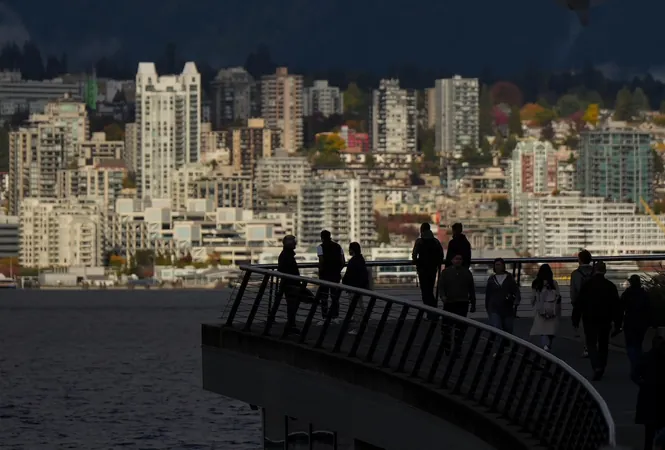
British Columbia's Economic Dilemma: Can Any Party Deliver Real Affordability?
2024-10-05
Introduction
As British Columbia approaches a pivotal election, one theme resonates deeply among voters: affordability. Both leading parties acknowledge this pressing concern, yet the province’s economic landscape poses significant challenges that could undermine promises of prosperity.
Current Economic Indicators
Recent fiscal updates reveal some positives; B.C. boasts a triple-A credit rating—unique among Canadian provinces—and maintains one of the lowest unemployment rates in the nation. However, the projected economic growth for the year hovers just below one percent, a lackluster performance that ranks B.C. at the bottom compared to its provincial counterparts, according to TD Economics.
Voter Priorities
Despite these economic indicators, average voters prioritize issues other than the economy, ranking health care, housing, affordability, and public safety higher, as reflected in a recent survey by the Vancouver Board of Trade. For the winning party in the October 19 vote, however, the state of the economy will critically shape their ability to address the pressing issues facing British Columbians.
The Economic Challenge
The incoming government will grapple with a staggering projected deficit of $10 billion, compounded by rising demands for public services and housing due to a burgeoning population. This economic fragility is exacerbated by dependency on unpredictable global commodity prices.
Population Growth vs Economic Performance
Remarkably, British Columbia has seen a historic population increase, with an additional 380,000 residents in just two years. Ironically, while the population surges, the economy, when factoring in per capita income, is contracting. This indicates a troubling trend of declining household incomes as each citizen shares an ever-smaller economic pie.
Political Perspectives on Economic Growth
The leaders of the two major parties—NDP’s David Eby and Conservative John Rustad—present contrasting visions for future economic growth. Experts like Trevor Tombe from the University of Calgary caution voters to view political claims about the economy through a critical lens, noting the complexities and regional variances within economic health.
Budget Deficit and Infrastructure Investment
Tombe emphasizes the significance of B.C.’s current budget deficit, acknowledging its short-term detrimental effects but also suggesting that the infrastructure investments could yield long-term gains. Nevertheless, neither party seems equipped to present a universally beneficial solution for the province's tax and affordability issues.
Inflation and Living Standards
In terms of inflation, B.C. has not been uniquely burdened compared to national trends; prices have surged by 18 percent on average over the last five years, with rental costs escalating by 26 percent during the same timeframe. Yet, with such a substantial rise in population and a stagnant economy, living standards for many residents continue to decline.
Debt and Job Creation
Adding to the financial woes, B.C.’s debt is on an upward trajectory, primarily leaning on public-sector employment, which has been the main driver of job creation. A recent assessment from Standard & Poor’s has downgraded B.C.’s credit rating from AA to AA-, while Moody’s maintains a triple-A rating with a cautionary negative outlook.
Critique of Fiscal Policies
Economists critique that while B.C.'s foundational economic factors remain sound, the current government's spending trajectory diverges from the containment efforts seen in other provinces aiming for balanced budgets. This divergence is raising eyebrows among financial analysts, who link fiscal decisions directly to the downgrade concerns.
Earnings and Job Opportunities
Chief economist Ken Peacock emphasizes the critical nature of per capita income, pointing out that the current economic climate results in weaker wage growth and fewer job opportunities. Against the backdrop of Canada’s overall poor economic performance, B.C. finds itself facing unique challenges—even if they are not alone in their struggles.
Election Outlook
As the election draws near, neither Eby nor Rustad has proposed a swift path back to budget surpluses. Rustad aims to balance the budget within eight years of a potential Conservative term, while Eby has committed to gradually reducing the deficit, although he refrains from specifying a timeline. His assertions of economic health are met with skepticism by many, especially as he acknowledges that most residents are not feeling the benefits of purported growth.
Party Promises and Economic Policy
Rustad has openly criticized the NDP's management, blaming high taxes and bureaucratic hurdles for deteriorating economic conditions. His promised tax cuts and infrastructure projects remain vague without a clear plan to ensure these commitments align with fiscal responsibility.
Conclusion
This election is shaping up to be a defining moment for British Columbia. Will voters choose a leader who can address the rising cost of living amidst an economic downturn, or will they continue to struggle under the weight of fiscal challenges? As affordability emerges as the pivotal issue of this election, the fate of countless residents hangs in the balance.









 Brasil (PT)
Brasil (PT)
 Canada (EN)
Canada (EN)
 Chile (ES)
Chile (ES)
 España (ES)
España (ES)
 France (FR)
France (FR)
 Hong Kong (EN)
Hong Kong (EN)
 Italia (IT)
Italia (IT)
 日本 (JA)
日本 (JA)
 Magyarország (HU)
Magyarország (HU)
 Norge (NO)
Norge (NO)
 Polska (PL)
Polska (PL)
 Schweiz (DE)
Schweiz (DE)
 Singapore (EN)
Singapore (EN)
 Sverige (SV)
Sverige (SV)
 Suomi (FI)
Suomi (FI)
 Türkiye (TR)
Türkiye (TR)